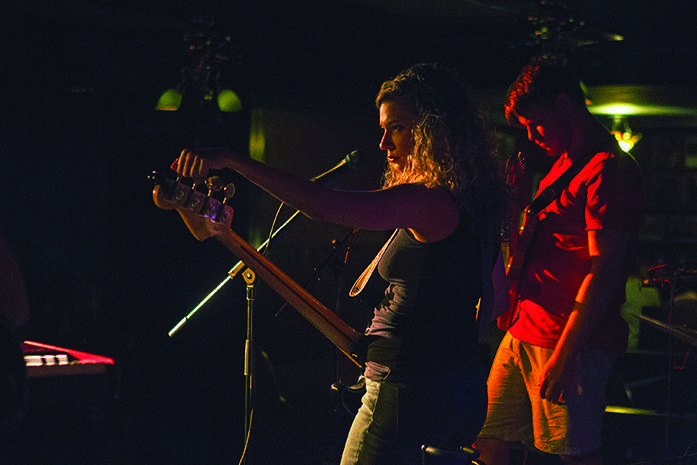By Girindra Selleck
[email protected]
A mountain of cords tangled like a plate of spaghetti lingered at the edge of the Mill’s stage after two strong opening acts by Dagmar and Briana Marela on Wednesday.
Two figures emerged from the dimly lit area, one dressed in jeans and a T-shirt and the other more eccentrically put together in a gray velour
tracksuit and a bright red curly wig. This was Jenny Hval, and she also carried a large yoga ball.
“We really have an apocalypse on stage here,” Hval said, as she set the ball down, referring to the pile of cords.
Hval, whose fifth studio album Apocalypse, girl was released in June of this year on Brooklyn-based label Sacred Bones, is a Norwegian experimental musician whose CV includes collaborations with members from legendary art-rock outfit Swans, a tour with St. Vincent, and a highly critically acclaimed collaborative album with compatriot Susanna Wallumrød.
From the beginning of the show until her last song, it was clear that Hval operates entirely on her own terms. Her music is no doubt experimental, fusing aspects of noise, rock, electronic, and spoken word, yet it somehow manages to remain accessible.
Her set took dramatic leaps between enchantingly melodious and jarring, but in both cases, she was able to captivate the audience and keep the members watching her every move.
Hval has been recording music since 2004; for a while, she used the moniker Rockettothesky, and then, since 2008, under her own name.
Before she began her career in music, Hval had a successful career as a writer — something one might suspect after listening to a few of her songs. She studied creative writing at the University of Melbourne, and then receiving a degree in literature from the University of Oslo before working as a journalist for a time and eventually publishing two books in her home country.
Her writing tendencies are evident in her music, which, among other things, deals directly with the modern definitions of gender and sexuality, skipping the inferences and subtleties employed by some of her contemporaries and diving right into the crux of the matter with lyrics as direct as “statistics and newspapers tell me I am unhappy and dying, that I need man and child to fulfill me, that I’m more likely to get breast cancer.”
“I feel like I’m singing in my own empty bar,” Hval said during a break before her final song, and the statement rang true.
Despite the crowd of people gathered to see her, it is clear that Hval’s music is a deeply personal affair. It is as if these songs are a collection of entries in Hval’s leather-bound diary, sitting propped open on the coffee table, and the audience was simply able to steal a glance before she realized it was exposed and closed it back up.



